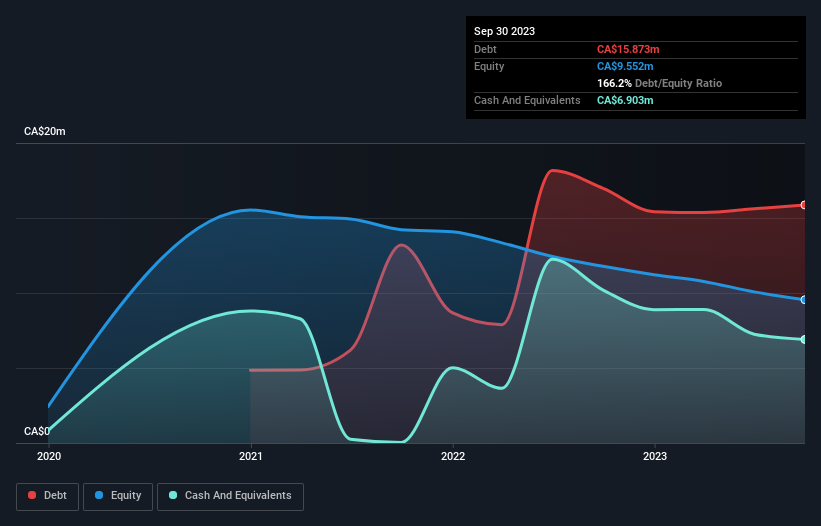David Iben put it well when he said, 'Volatility is not a risk we care about. What we care about is avoiding the permanent loss of capital.' So it seems the smart money knows that debt - which is usually involved in bankruptcies - is a very important factor, when you assess how risky a company is. We can see that Kadestone Capital Corp. (CVE:KDSX) does use debt in its business. But the real question is whether this debt is making the company risky.
When Is Debt A Problem?
Debt and other liabilities become risky for a business when it cannot easily fulfill those obligations, either with free cash flow or by raising capital at an attractive price. In the worst case scenario, a company can go bankrupt if it cannot pay its creditors. However, a more common (but still painful) scenario is that it has to raise new equity capital at a low price, thus permanently diluting shareholders. Of course, plenty of companies use debt to fund growth, without any negative consequences. When we think about a company's use of debt, we first look at cash and debt together.
View our latest analysis for Kadestone Capital
What Is Kadestone Capital's Net Debt?
The image below, which you can click on for greater detail, shows that Kadestone Capital had debt of CA$15.9m at the end of September 2023, a reduction from CA$17.0m over a year. However, because it has a cash reserve of CA$6.90m, its net debt is less, at about CA$8.97m.

How Healthy Is Kadestone Capital's Balance Sheet?
The latest balance sheet data shows that Kadestone Capital had liabilities of CA$11.0m due within a year, and liabilities of CA$5.16m falling due after that. Offsetting this, it had CA$6.90m in cash and CA$8.7k in receivables that were due within 12 months. So it has liabilities totalling CA$9.22m more than its cash and near-term receivables, combined.
This deficit isn't so bad because Kadestone Capital is worth CA$36.6m, and thus could probably raise enough capital to shore up its balance sheet, if the need arose. However, it is still worthwhile taking a close look at its ability to pay off debt. There's no doubt that we learn most about debt from the balance sheet. But you can't view debt in total isolation; since Kadestone Capital will need earnings to service that debt. So if you're keen to discover more about its earnings, it might be worth checking out this graph of its long term earnings trend.
It seems likely shareholders hope that Kadestone Capital can significantly advance the business plan before too long, because it doesn't have any significant revenue at the moment.
Caveat Emptor
Importantly, Kadestone Capital had an earnings before interest and tax (EBIT) loss over the last year. Indeed, it lost CA$3.4m at the EBIT level. When we look at that and recall the liabilities on its balance sheet, relative to cash, it seems unwise to us for the company to have any debt. So we think its balance sheet is a little strained, though not beyond repair. However, it doesn't help that it burned through CA$2.8m of cash over the last year. So suffice it to say we consider the stock very risky. There's no doubt that we learn most about debt from the balance sheet. But ultimately, every company can contain risks that exist outside of the balance sheet. For example Kadestone Capital has 4 warning signs (and 3 which don't sit too well with us) we think you should know about.
If, after all that, you're more interested in a fast growing company with a rock-solid balance sheet, then check out our list of net cash growth stocks without delay.
Valuation is complex, but we're here to simplify it.
Discover if Kadestone Capital might be undervalued or overvalued with our detailed analysis, featuring fair value estimates, potential risks, dividends, insider trades, and its financial condition.
Access Free AnalysisHave feedback on this article? Concerned about the content? Get in touch with us directly. Alternatively, email editorial-team (at) simplywallst.com.
This article by Simply Wall St is general in nature. We provide commentary based on historical data and analyst forecasts only using an unbiased methodology and our articles are not intended to be financial advice. It does not constitute a recommendation to buy or sell any stock, and does not take account of your objectives, or your financial situation. We aim to bring you long-term focused analysis driven by fundamental data. Note that our analysis may not factor in the latest price-sensitive company announcements or qualitative material. Simply Wall St has no position in any stocks mentioned.
About TSXV:KDSX
Kadestone Capital
Operates as a real estate investment and development company in Canada.
Slight risk with worrying balance sheet.
Market Insights
Community Narratives




